- Home
- Catherine Spencer
Passion's Baby Page 4
Passion's Baby Read online
Page 4
“No,” she said shortly. “But a working brain is a definite must and yours, I begin to suspect, has yet to be taken out of the box it came in.”
Her observation caught him squarely as he drained his glass, turning the chuckle he couldn’t quite smother into a coughing fit as the wine went down the wrong way. “Okay,” he croaked, when at last he managed to regain his breath, “you win this round. I admit I was ticked off when it seemed you were a no-show and I acted like an idiot. Can we start over, if I promise to polish my skills as a host?”
“I’m not sure,” she said, even though trying to hang on to her annoyance in the face of such a disarming confession was a lost cause, particularly with Bounder fawning shamelessly all over the object of her displeasure. “I can’t say I was flattered by your description of me.”
Steering his chair around the hammock to where Steve’s old kerosene storm lantern sat on a shelf on the wall, Liam put a match to the wick. Just briefly, before he swung around to face her again, the aura of light limned his features in gold and revealed the smile lurking at the corner of his mouth. “You mean the bit about your being not bad-looking?”
“That’s not quite how you worded it, but since we’re aiming for a fresh start, I won’t quibble over semantics.”
“In that case,” he said, heading down the ramp to the grassy area below, “if you wouldn’t mind pouring the wine, I’ll get the fire started, and we can engage in idle gossip and watch the sun go down while we wait for the water to boil.”
Somehow, she doubted Liam McGuire was the kind of man who ever wasted time being idle about anything. He was too full of a restless energy turned inward by the physical restrictions he was forced to endure. Talk about an inquiring mind! He didn’t just look at a person, he looked inside her, his cool gaze probing her most private thoughts.
She’d no sooner joined him at the fire pit than the inquisition began. “Cheers,” he said, raising his glass to hers, and before she had time to acknowledge the toast, let alone take a sip of the wine, went on, “Tell me how your better half wound up in a wheelchair.”
“What?” She stared at him in offended disbelief. Was the man completely insensitive to everyone’s pain but his own?
“Tell me about your husband. I’m curious.”
“Well, that’s certainly stating the obvious! The question is, why do you want to know?”
“Well, we’ve got to talk about something and the last time you were here, you made some remark about understanding my frustration at being in this damned contraption because you’d seen him go through the same thing.” He shrugged, and poked at a chunk of driftwood which had fallen away from the flames. “But if talking about it touches a nerve, we can always debate the vanishing ozone layer or the migration of the otter flea.”
“I didn’t know otters had fleas,” she said stiffly.
Leaning toward her, he planted his elbow on the arm of his chair, rested his chin on his fist, and fixed her in that disturbing gaze of his. “His death’s still too painful to talk about, huh, even after two years?”
“It’ll never be easy. But I’ve come to terms with it.”
“What went wrong? An accident of some sort?”
“No. He had ALS. Amyotrophic lateral sclerosis, although most people call it—”
“Lou Gehrig’s disease.” He grimaced. “Yeah, I know. It’s one of those things that…well, I don’t have to tell you. You lived it. How long was your husband…?”
“Seven years. We’d been married only eighteen months when he was diagnosed.”
Liam inhaled sharply. “Barely past the honeymoon stage! You can’t have been much more than a kid. And you hung in over the long haul?”
“Well, of course I did!” she said indignantly. “What did you think? That I’d walk out on him because he didn’t remain the perfect, healthy specimen I’d married?”
“A lot of women would have, wedding vows about sticking it out in sickness and in health notwithstanding.”
“If you believe that, then you obviously don’t know much about love.”
“Maybe not, but I know a lot about women.”
Jane stared at him, taken aback by the surge of bitterness which colored his remark, and suddenly as curious about his past as he was about hers. “I don’t suppose you’d care to elaborate on that?”
“Not particularly.” Awkwardly, he bent to wedge another piece of wood under Steve’s old metal crab pot. She could have done it for him in a fraction of the time, but she knew better than to offer.
“It’s going to take a while for this water to come to a boil,” Liam said, “but I’ve got nuts and stuff to snack on while we’re waiting. If you want to make yourself useful, you could get them—they’re in the kitchen—and bring another bottle of wine out of the refrigerator.”
He’d tidied the place up in her honor she noticed when she went inside. The floor had been swept and the counter was empty except for a cardboard box holding cutlery, plates and a roll of paper towels, a loaf of bread, a bag of prepared salad greens, and some packages of nuts and pretzels.
She found the wine and a corkscrew, and emptied the snacks into a wooden salad bowl. When she went back outside, the fire had taken hold and Liam sat with his gaze fixed moodily on the flames licking up the side of the blackened old pot, and Bounder sleeping next to his chair.
Taking a seat at the picnic table, Jane helped herself to a handful of nuts before passing the bowl to Liam. He nodded his thanks and for a while nothing disturbed the silence except the occasional cry of a seagull and the spit and crackle of the driftwood fire. The sky had paled to winter melon green with the sun’s passing and the first faint stars twinkled to the east.
From where she sat, Jane was able to take in the sweep of ocean and distant mountains and, much closer at hand, her host’s unruly mop of dark hair and width of shoulder.
What happened to make you so wary of other people? she longed to ask, and knew a shocking urge to reach out and touch him. There was such a loneliness about his still figure, such a need for gentleness.
Suddenly, as if he knew she was burning up with curiosity, he announced, “You aren’t the only one who’s been married, you know. I tried it once myself.”
He flung the information down like a challenge, as if daring her to take issue with it. “Did you?” she said mildly.
When he didn’t immediately reply, she left it at that and for a while the silence came swarming back, seeming deeper with encroaching night. The flames grew brighter, higher, and a mist of steam rose from the crab pot. Bounder stirred and shifted to a more comfortable position, with his nose nudging the wheelchair’s foot-rest.
“I’m divorced, in case you’re wondering.”
In light of his caustic tone of voice, she’d have had to be mentally defective not to have figured that much out for herself. But it seemed politic not to say so, so she stuck to a sympathetic, “I’m sorry.”
“I’m not!” His shoulders jerked in bitter amusement. “I consider myself lucky to be rid of her.”
“Don’t you find that rather sad?”
He tossed her an incredulous glance. “Hell, no! Why should I?”
“Because presumably you were in love with each other once, and when those feelings died, you lost something precious.”
“I lost a money-hungry parasite, sweetheart! Caroline kept a calculator where her heart was supposed to be. Her chief hobby was adding up how much a man was worth, and whether he could afford her or not. Love wasn’t part of the equation.”
“In that case, why did you get married in the first place?”
“I asked myself the same question for years and never did come up with an answer that made any sense. Put it down to a combination of lust, wilful blindness on my part, and great acting on hers. Around the time I found out she wasn’t what she’d first seemed, she decided she didn’t like the demands of my job and found comfort in some other guy’s arms while I was away on a project. Last I heard, she’d dumped
him for somebody with a fatter wallet.”
“I can’t imagine any wife behaving like that,” Jane said, wondering if his abrasive front was really nothing more than camouflage to hide a broken heart.
“Oh, trust me, it happens! Just because you spent all your free time polishing your halo, don’t assume every other woman does the same.”
“I resent that,” she said, the surge of compassion he’d awoken in her evaporating just as rapidly as it had arisen. “There was nothing long-suffering about my devotion to Derek. I loved him and he loved me, and we both honored our wedding vows. So don’t you assume just because your marriage fell apart, that mine was held together by baling wire and pity, because it wasn’t! It was strong enough to stand on its own merits, regardless of what life threw at it.”
“And it ended before the strain began to tell.”
“Why, you…you…unfeeling brute!”
“That’s me, all right,” he said, supremely unmoved by her distress. “Stroking fragile egos isn’t one of my talents. I prefer to deal with reality.”
“Oh, who do you think you’re kidding?” she snorted. “You’re so busy trying to ignore the fact that you’re handicapped that you can’t even accept a little help without getting all bent out of shape. You could give lessons on stroking the fragile ego, as long as it’s yours that’s getting stroked!”
He bent to scratch Bounder’s ear and she heard the laughter in his voice when he said, “That’s women for you, Blunder, old pal! Going straight for the jugular. Take my advice and steer clear of the lot of them.”
Bounder reared up, placed a paw on Liam’s lap, and gazed at him adoringly. Talk about male bonding! The whole performance was enough to turn Jane’s stomach. “I’m beginning to wonder why I ever agreed to come here this evening,” she said.
Liam gave another of those annoyingly self-satisfied chortles, as though, having his vented his disillusionment with women in general, he could now afford to take a warped kind of pleasure in her company. “Well, it’s too late to back out now, sweetheart. The water’s boiling and the crabs need to be thrown in the pot.”
“I’d offer to help,” she said sourly, “but I’m afraid I might give in to the urge to shove you in, as well.”
He laughed outright at that, and rolled the wheelchair dangerously close to the fire. “Watch it, Janie! Your halo’s slipping—though I have to admit, I like you better this way. Keep it up and you just might get asked back again. In fact, if things were different, I might have tried to put the moves on you.”
His arrogance, she decided balefully, was exceeded only by her foolishness. She had no business feeling all warm and fuzzy inside at his backhanded compliment, and no business at all wondering what it would take to change his views on love and marriage. He was a confirmed bachelor, and just as well because he’d make a lousy husband. Not that she was interested in finding one. She was perfectly content to be remain single, despite what her friends thought.
Two years is long enough to put the grieving behind you and get on with your life, Jane, they’d scolded kindly, and she’d have agreed with them if it weren’t for the fact that, to them, “getting on” with her life meant finding a new man. They hadn’t understood that she needed time for herself.
“In case you didn’t realize, I just paid you a compliment,” Liam said, flinging the last of the crabs into the pot. “So why the grim expression?”
“I was thinking.”
“If it’s that much of an effort, perhaps you shouldn’t bother.”
She rolled her eyes. “Very funny, I’m sure. Do you ever get through a conversation without slinging a few insults around?”
“Lighten up, Janie. I was just kidding.” He watched her narrowly through the swirls of steam rising from the pot. “What dire thoughts took hold so suddenly?”
“I was thinking about my friends. In their opinion, it’s time I got married again.”
“Cripes, I hope you’re not checking me out as a prospective candidate!”
“Don’t flatter yourself, McGuire. The reason I came to the island was to get away from all that well-intentioned advice. And even if I felt inclined to follow it, yours would be the last name on the list.”
“That’s a relief.” He stirred the contents of the pot with a long-handled rake, then said, “I thought you claimed yours was a good marriage.”
“It was.”
“So why the reluctance to get involved again?”
“I’m not saying I plan to remain single for the rest of my life, necessarily. I’m just not in any hurry to find a husband.”
“Because you’re still in mourning?”
“Not in the way you might think.” She sighed, not sure she wanted to explain; not sure if he was capable of understanding, even if she tried.
How could mere words convey the tragedy of a once-vital man fading away, or the triumph of human dignity in the face of suffering? How to explain that Derek’s courage had been an inspiration which had kept her afloat in the months following his death?
But Liam wasn’t inclined to drop the subject. “Now you’ve got me curious. Care to elaborate?”
“I loved my husband dearly, but his death came as a relief. Watching him deteriorate drained me, too. I knew how he hated his reliance on others. It hurt to see former friends drift away, to watch him become more isolated in the prison of his disease. How could I claim to love him and at the same time want him to remain alive for my purely selfish reasons?”
“That was never your choice to make,” Liam said with surprising insight. “You were just as much a prisoner as he was, and just as much a victim of his illness.”
His ability to go straight to the heart of things in a way that friends had not been able to do left her throat suddenly thick with tears.
“Yes,” she said, hanging on to her composure with a supreme effort. “We prepared for his death together and after, when the formalities were done with, I set out as we’d agreed I should, to make a new life. But words are easy. It’s the doing that’s hard. As the sadness at his dying diminished, I became so…angry at the way we’d been cheated. We’d once shared so many dreams for the future, and I found I couldn’t let go of them. I clung to them because doing so kept the memory of him, as he used to be, alive in my heart. I didn’t want to remember him as he’d been at the end.”
“It’s natural enough to want to hang on to the good times, Jane. They’re what keep us going when misery threatens to take over.”
“I know. But it meant that, after adjusting to the loss of a very sick husband, I spent another year mourning the loss of that other man, the one who’d been so alive, who’d waited at the altar for me, who’d whisked me off to Bali for our honeymoon, who’d taken me white-water rafting down the Fraser River, who’d played tennis with me at the club and ridden elephants with me in Thailand.”
She hadn’t even realized she was crying until the tears splashed down the front of her shirt. She searched through her pocket for a tissue and when she didn’t find one, scrubbed at her face with her fingertips while Liam sat and watched.
“You could at least offer me something to wipe my nose with,” she sniffled, embarrassed by his unwavering gaze.
“There’s a box of tissues inside on the coffee table. Help yourself.”
Grateful for the excuse to escape, she scuttled away to mop up the damage. When she came back out again, she brought the plates and other paraphernalia for the meal with her. Liam was lifting scarlet-shelled rock crabs out of the pot and arranging them on a metal tray, but he stopped to watch as she laid everything out on the picnic table.
“Didn’t anyone ever teach you that it’s rude to stare?” she inquired irritably, trying not to squirm in the face of his continued scrutiny.
He dismissed the question with a nonchalant shrug. “It’s okay to cry, you know. Everyone does, at one time or another.”
“Not you,” she said, busying herself setting the table. “I bet you can’t remember the last ti
me you broke down in tears.”
“Yeah, well, for once, we aren’t talking about me. We don’t have to talk about you, either, if it’s so painful.”
Her hands stilled. In fact, every part of her seemed to grow quiet—less because of what he said than at how he said it. Once again, he’d caught her off guard with his rare kindness. “Actually, it’s not. I don’t really know what started me crying just now.”
It was a lie, but she didn’t dare tell him the truth: that his implicit understanding of everything she’d said had triggered the outburst.
“What most people don’t understand,” she said, “is that once a person gets past the mourning stage, she needs time to replenish herself before moving on to the next phase in her life. It’s only been in the last six months or so that I’ve come out the other end of the tunnel, as it were, but my friends immediately made it their mission to pair me up with another potential husband. They can’t accept that I’m happy just to be alone for a while.”
“Makes perfect sense to me.” He gestured at the tray. “Dinner’s ready. We can eat out inside, if you’re finding it too chilly.”
“Out here is fine.”
He threw another log on the fire, then rolled his chair next to where she sat at the table. “So, what else are you, besides a widow?” he asked, refilling their glasses. “What do you do, when you’re not on vacation?”
“I’m the loans manager at a suburban bank branch in Vancouver. I went back to work right after the funeral. At the time, it seemed the best thing—keeping busy, and all that—but since the beginning of the year, I’ve had one cold after another and in May came down with a really bad bout of the flu which turned into pneumonia. My doctor recommended a complete change of pace for a while, so I’ve taken a three month leave of absence. I plan to do nothing but soak up the sun and laze away the days until September.” She angled a glance at him. “What about you? Why are you here?”
“Because I’m not much use at work right now. I’d have thought that was obvious.”

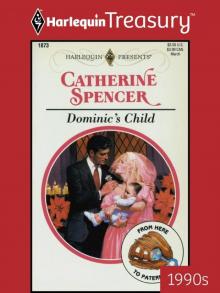 Dominic's Child
Dominic's Child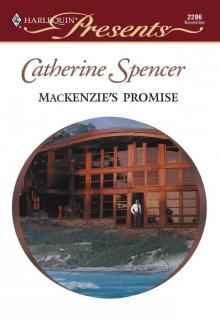 MacKenzie's Promise
MacKenzie's Promise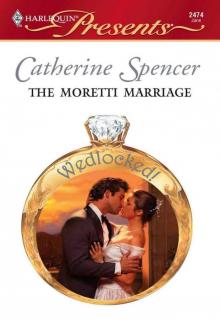 The Moretti Marriage
The Moretti Marriage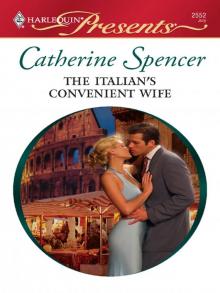 The Italian s Convenient Wife
The Italian s Convenient Wife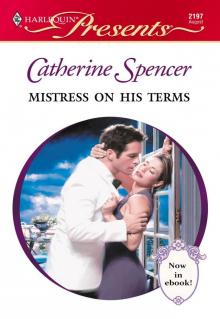 Mistress on His Terms
Mistress on His Terms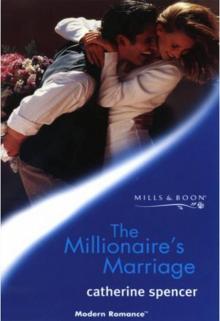 The Millionaire's Marriage
The Millionaire's Marriage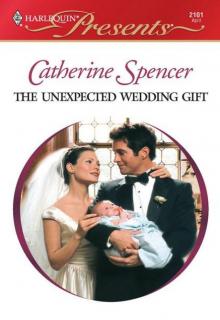 The Unexpected Wedding Gift
The Unexpected Wedding Gift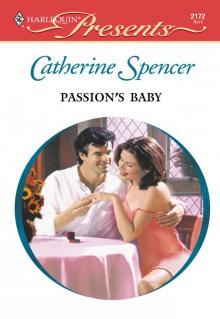 Passion's Baby
Passion's Baby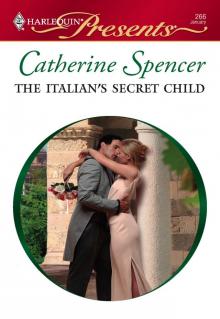 The Italian's Secret Child
The Italian's Secret Child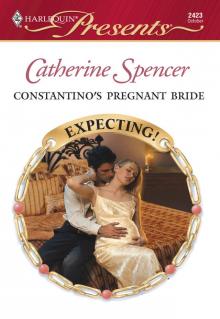 Constantino's Pregnant Bride
Constantino's Pregnant Bride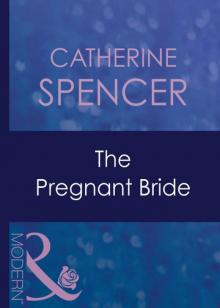 The Pregnant Bride
The Pregnant Bride Christmas With A Stranger_Forbidden
Christmas With A Stranger_Forbidden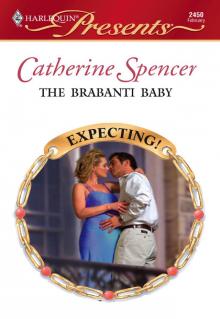 The Brabanti Baby
The Brabanti Baby Convenient Brides
Convenient Brides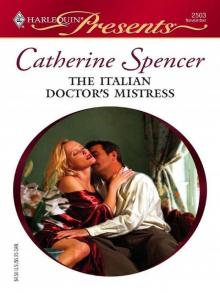 The Italian Doctor’s Mistress
The Italian Doctor’s Mistress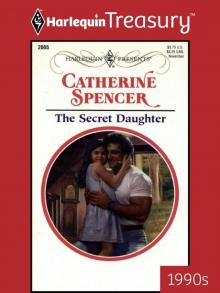 The Secret Daughter
The Secret Daughter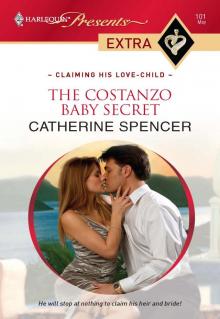 The Costanzo Baby Secret
The Costanzo Baby Secret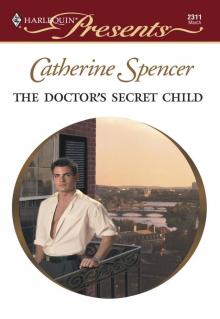 The Doctor's Secret Child
The Doctor's Secret Child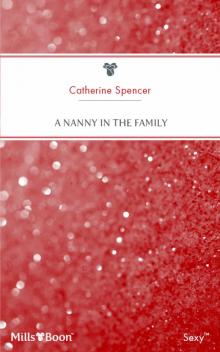 A Nanny in the Family
A Nanny in the Family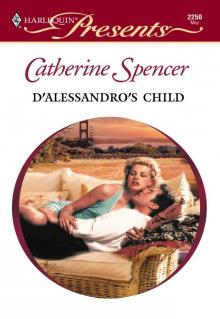 D'Alessandro's Child
D'Alessandro's Child In the Best Man's Bed
In the Best Man's Bed